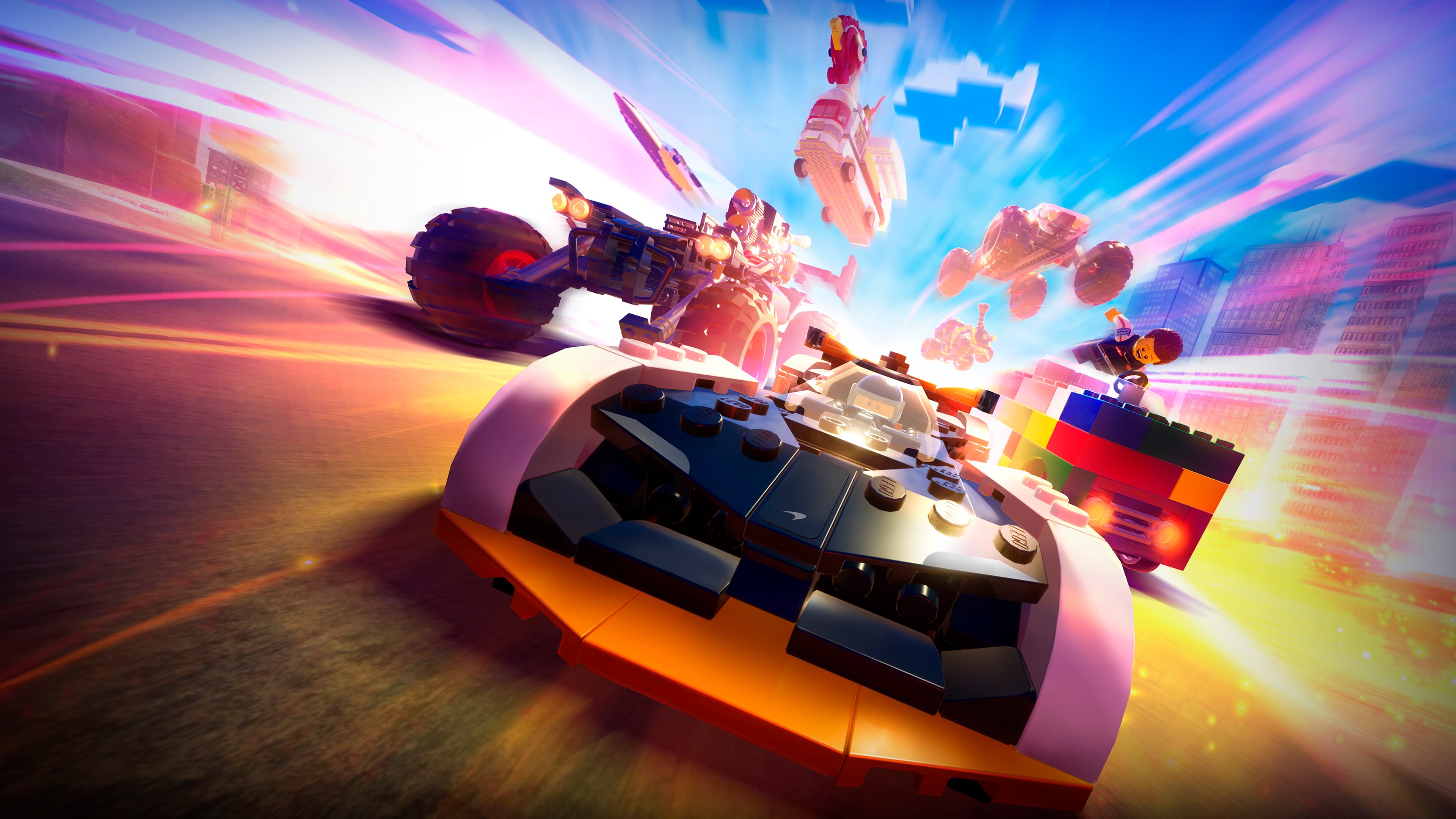
Time played: 15 hours
Platform: PC
Lego 2K Drive may not literally reinvent the wheel but it does build upon it. Equal parts exciting racer and extensive building title, this open world driving game can easily be considered one not just only one of the best Lego games, but one of the best racing games as a whole. With clear inspiration from the likes of Forza Horizon 5 as well as Sonic and All-Stars Racing Transformed, the sum of its parts come together to be the best new kart racer in years.
Set across the expansive Bricklandia, you play as the next big thing in the Lego racing scene. Guided by Clutch Racington (yes, seriously), you drive across the roads, hills and even rivers, meeting and beating new rivals, and building all manner of vehicles in pursuit of first-place glory. It’s a simple premise, but one that’s done justice by Lego’s typical irreverence, with a wry presentation that largely follows in the wake of the popular Lego Movie duology from a number of years ago.
Lego 2K Drive price and release date
- What is it? An open-world racing game based on the Lego franchise
- Release date: 19 May, 2023
- What can I play it on? PS5, Xbox Series X, PC, Nintendo Switch, PS4, Xbox One
Now you see me
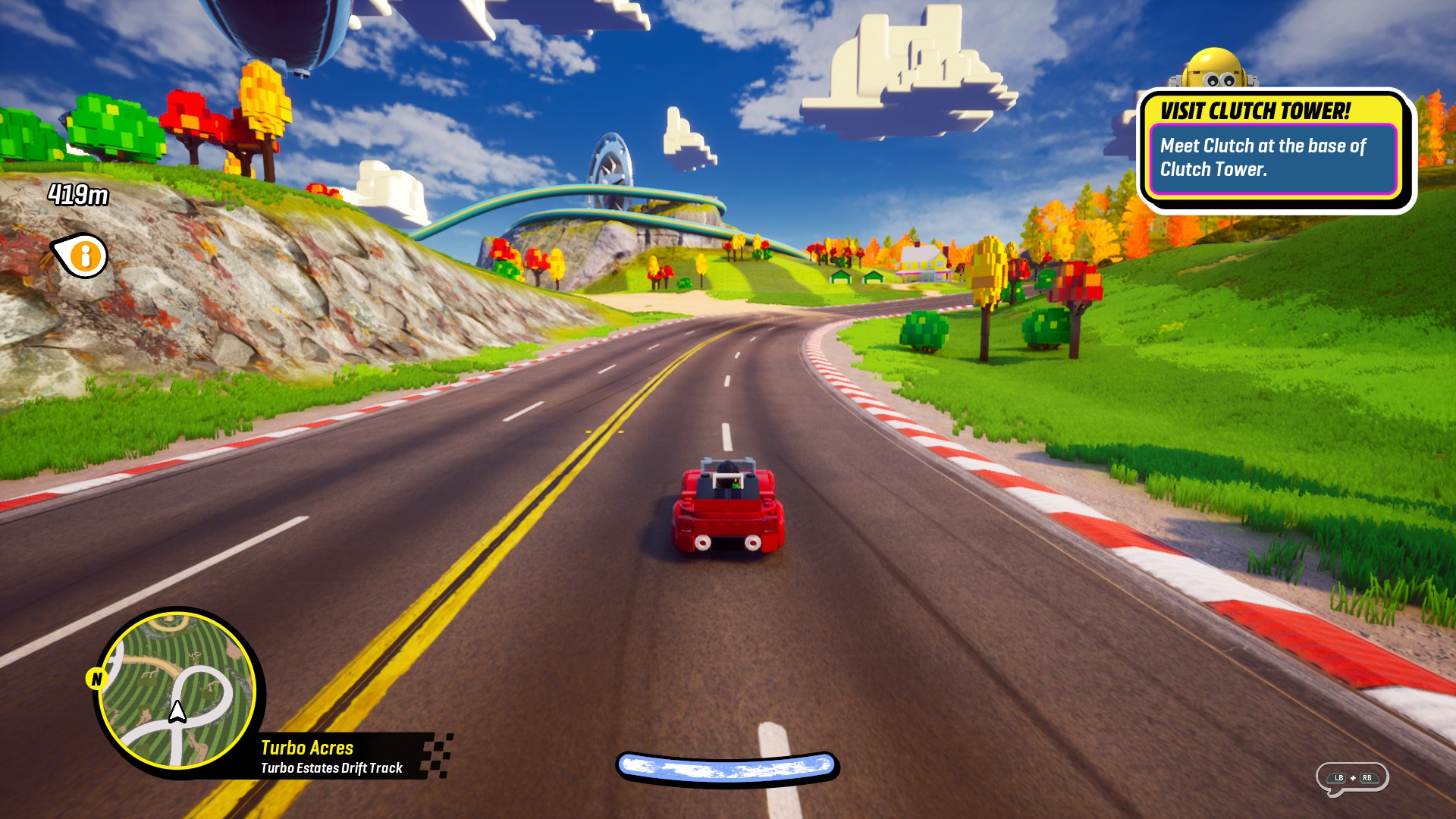
Lego 2K Drive’s most exciting part is how mechanically solid plowing through the game’s biomes feels. Whether you’re going off-road in the rocky expanses of Big Butte County, cruising down the cascading lakes of Hauntsborough, or rushing through the bustling streets of Prospecto Valley, how you get around is unlike any other racing game of its type. That’s because vehicles can transform to suit their environment. With the press of LB / L1 on your controller, your mode of transport becomes one of three different machines based on street, off-road, and water.
That’s because your Lego racer has a loadout of all three. Whilst cruising and drifting on slick city streets, a finely tuned performance car is going to handle best, but could struggle when taking things off the beaten track. What seems like a neat gimmick at first quickly becomes part of the central gameplay loop if you want to actually get anywhere in this game both metaphorically and physically.
Also armed with the ability to jump, boost, quick-turn and drift, the manual transformation of your vehicles adds a new dimension to exploration and racing. These transformations turn what would have otherwise been a pretty standard kart racer into something truly its own. One second you’ll be taking a sharp bend on Vessel Run or Cat Scratch Freeway, looking like you’re about to plummet off course, before a carefully timed jump and change to an offroad vehicle can help you regain momentum. Another moment could see a frantic boat race on the raging rapids of Swampus switch up a gear by strategically ramping off rocks for added height to boost from as you soar above your water-bound rivals.
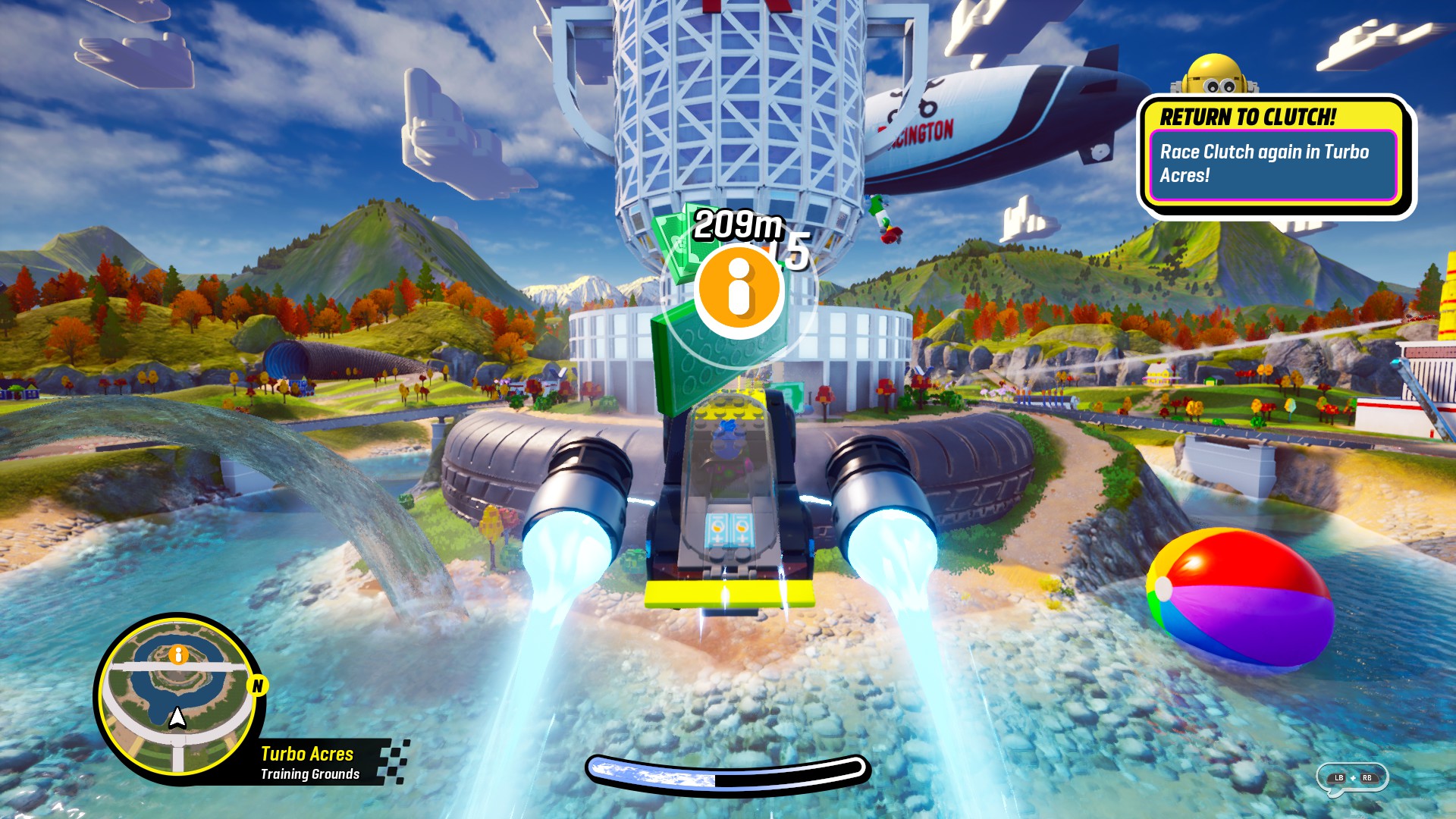
It's a rewarding core loop that satisfies regardless of whether you’re competing in one of the detailed races, or just driving around and killing time. The extent of the vehicle transformations combined with open-world traversal is something I haven’t experienced with the likes of Mario Kart 8 Deluxe, Crash Team Racing Nitro-Fueled, or even Sonic and All-Stars Racing Transformed’s track-to-track format. Races are consistently entertaining, with set pieces happening all around you as you and seven other plastic motorists collide as displaced Lego bricks fly everywhere.
As expected from an open-world racing game, there’s a tonne of things to do in these distinct biome areas other than race, though some are clearly more thought out than others. The open-world experience is segmented by a leveling system. You gain experience points and cash as you complete tasks which can range from quests to minigames that pop up as and when. Quests are generally short but sweet and can range from retrieving lost dolphins near a waterfall to seeing how many sick jumps you can make on a quad bike in 60 seconds. Unfortunately, the minigames don’t offer the same novelty and get old pretty quickly. There are two archetypes that you’ll play through: escort and defense. While fine at first, these missions quickly overstay their welcome, offering repetitive gameplay that fails to capitalize on Lego 2K Drive’s otherwise exciting systems.
Build it up
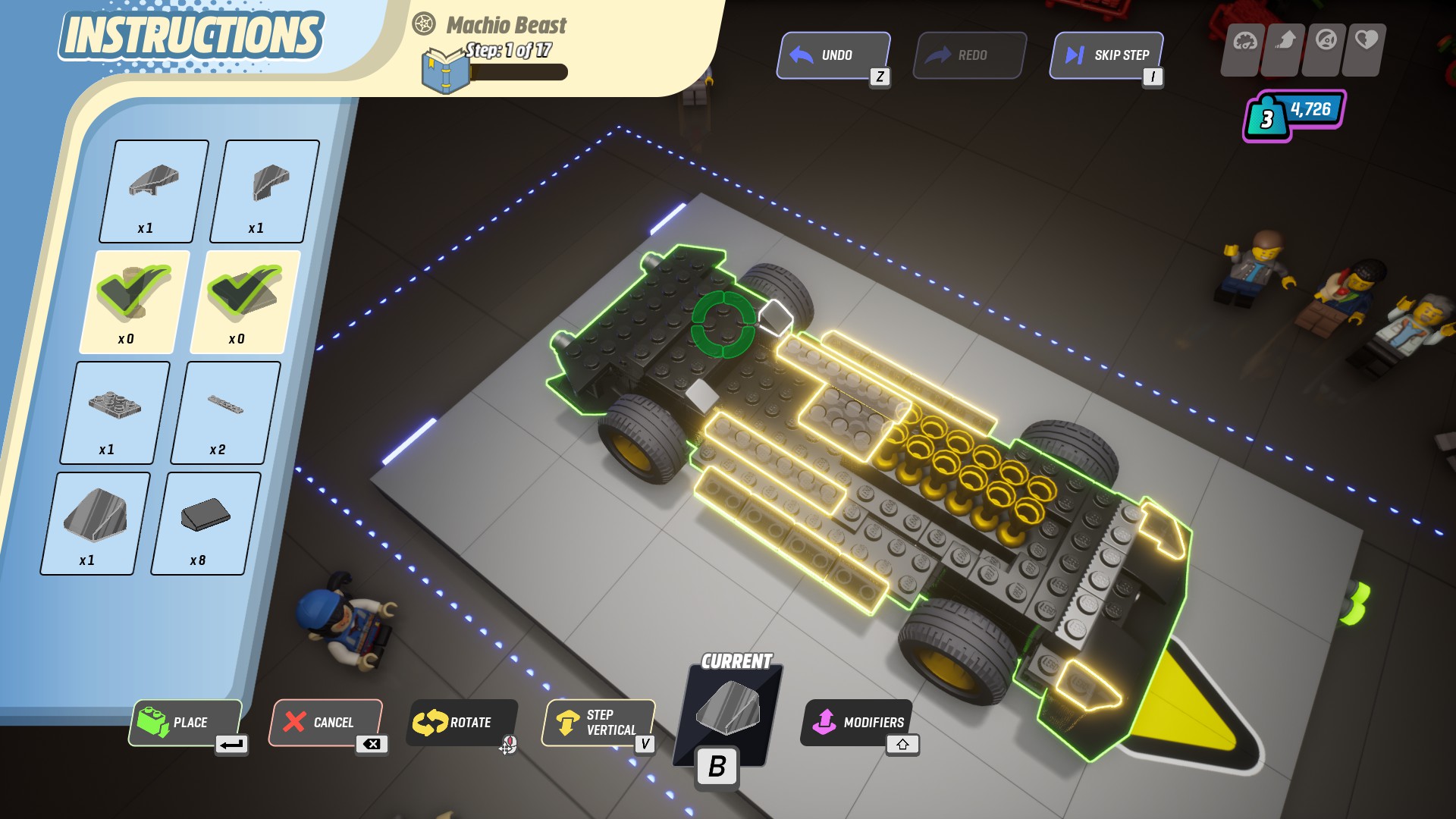
Lego 2K Drive isn’t just a racer; it’s a builder. The Garage is where you can build new street, off-road, or water vehicles, as well as customize existing ones. It’s an incredibly robust and detailed system giving you free rein to construct just about any vehicle you want. Once you pick your basic chassis, you’ll then be introduced to a blisteringly vast library of Lego bricks with which you can design your ride of choice.
There’s an entire catalog of detailed tutorials which walk you through how to construct lovely-looking cars and boats in an instruction manual format. Much like with LittleBigPlanet Karting or Modnation Racers before it, These tools are an awesome addition, but not a feature that I found myself going out of my way for. Tweaking existing vehicles was something that I found more enjoyable, like giving my hard-won McLaren Solus GT a fresh splash of paint and some much-needed stat adjustments.
What I’m much less keen on is Unkie’s Emporium which serves as an in-game storefront to spend all your Lego Brickbux. It comes down to the fact that you earn a comparatively small amount of money after every race won or quest completed, meaning that it’s going to take you a lot of grinding if you’re pining for a new vehicle, racer, or accessory for your ride. In my time with Lego 2K Drive, I was barely able to scrounge up 4,000 Brickbux, which paled in comparison to the price tags of the Beach Runner, Go Kart, or Zombie Smasher Roadster which all land between 10,000 - 14,000 units of the virtual currency.
Those are some of the cheapest pre-built sets, too. Some bundles can run as high as 22,400 Brickbux, and many designs are locked behind the Drive Pass, which is similar to how free-to-play games like Fortnite do business. For a game that’s base edition costs $69.99 / £59.99 / AU$149.95, it stings to see the full suite of customization options hidden behind paywalls.
Catch me if you can
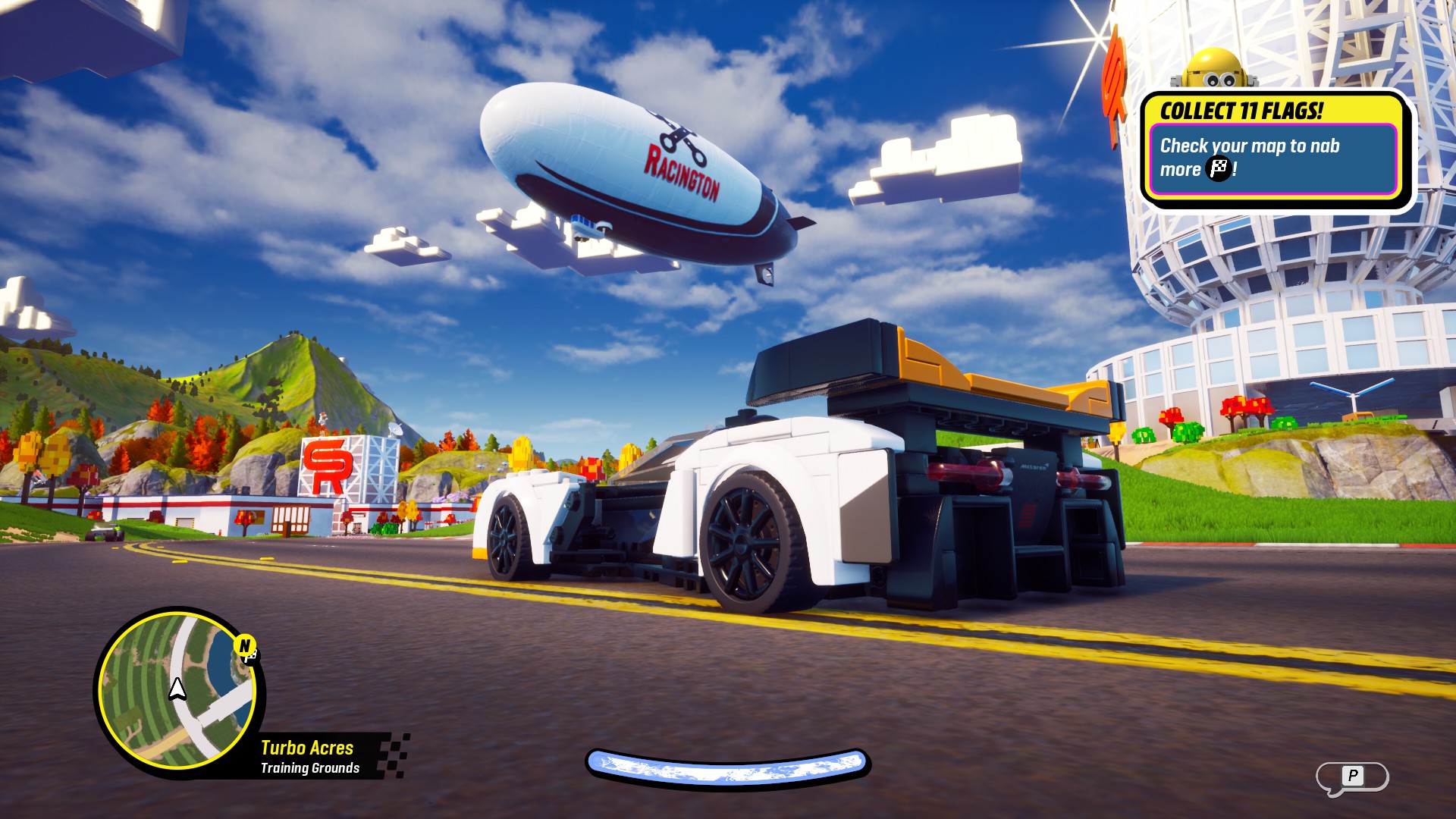
What I was pleasantly surprised by is just how challenging the races themselves would become as the campaign progressed. Similar to how the Mario Kart series measures speed and intensity from 50cc and up, Lego 2K Drive uses a Class system of C, B, and A to determine the speed and difficulty of a given race.
As you start to rise through the ranks, you’ll quickly see your fellow Lego racers using shortcuts, utilizing power-ups effectively, and undercutting you on tight turns. The enemy A.I. is impressive and really makes you work for those wins. It’s a massive improvement on the tournament setups from the likes of Mario Kart 8, and all the better for it.
Microtransactions aside, Lego 2K Drive is the best thing to happen to the kart racing genre in well over a decade. No matter how many races I’ve won, or the destruction I’ve caused, I find myself forever drawn back to the tight mechanics and wholesome setting. If you’ve been looking for something different to your standard racing sim or arcade title, or for a game to use one of the best racing wheels on then you’ll find it here.
Lego 2K Drive was reviewed on PC with a code supplied by the publisher.







